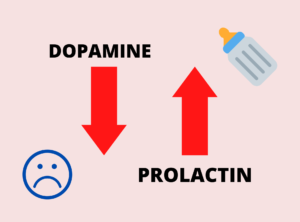
After discovering that I had a rare breastfeeding condition, I started to research what causes Dysphoric Milk Ejection Reflex and how to cope with it while breastfeeding.
Dysphoric Milk Ejection Reflex (D-MER) is a condition that causes women to have intense feelings of sadness or anxiety while breastfeeding. One theory is that it is caused by a drop in dopamine right before a letdown. Although there is no current treatment for D-MER, it can be helpful to try to understand the condition as well as learn ways to cope.
What is D-MER?
Very little is understood about Dysphoric Milk Ejection Reflex (D-MER) due to the current lack of research. As someone who suffers from the condition myself, I found myself searching for answers.
I am not a doctor so anything that I provide in this article should not be taken as medical advice, rather as my opinion from personal experience. A medical professional should always be consulted for individual guidance.
As I mentioned above, D-MER is a rare nursing condition that causes a woman to feel intense sadness or anxiety before or upon having a letdown during breastfeeding. A letdown is the sensation of milk leaving one’s body.

That sadness or anxiety can present as any of the following feelings:
-depression
-loneliness
-rage
-irritability
-disgust
-nausea
-food aversion
-fear
-self-doubt
There could be other feelings associated with the condition, but these are the feelings that I have gathered from family, friends, and from personal experience.
Those feelings only last for a very short period of time. Anywhere from 10 to 90 seconds. And they are always felt in close proximity, usually before, a letdown.
If you experience these feelings for long periods of time with no correlation to breastfeeding, you could be experiencing postpartum depression or anxiety and should contact your doctor.
What causes DMER?
Again, there is very little known about DMER and its origins. Anything found online, even from medical studies, is only theoretical because not many case studies have been performed. And to reiterate- I am not a medical professional. I have a degree in interior design. But this is what I have gathered from my research over the years.
D-MER is most likely caused by fluctuation in hormones during breastfeeding.
There are 3 main hormones at play when a mother goes to feed her baby- dopamine, prolactin, and oxytocin. Dopamine is a hormone that affects how we experience pleasure, prolactin is a hormone that helps us produce milk, and oxytocin is the hormone that helps push the milk out of our bodies.
Dopamine is a prolactin inhibitor. This means that in order for prolactin to help us produce milk, dopamine levels need to decrease. Studies show that having low levels of dopamine can cause people to have feelings of depression.

So what is happening when a mother goes to feed her baby is that the baby is signaling that milk needs to be produced, which means prolactin needs to be released. In order for prolactin to be released, dopamine levels need to drop. Once the dopamine levels drop, this causes some women to experience depressed or anxious feelings.
This would explain why some women feel sad right before having a letdown. They are consciously experiencing that drop in dopamine. It would also explain why the feelings of sadness are only experienced for a short period of time because once prolactin is released either the dopamine levels return to normal or the release of oxytocin counteracts our feelings of sadness.
What we don’t yet know is why some women experience this sadness, while others don’t
Who does DMER affect?
Dysphoric Milk Ejection Reflex is likely hereditary. Anecdotal evidence shows that often people in the same family have the condition. From personal experience, my cousins and I experienced D-MER with each of our babies.
In addition to being hereditary, unfortunately, if you had D-MER with one of your children, you are likely to have it again with any subsequent breastfed babies.
Although this may sound daunting if you experience D-MER and you want to have more kids, there are ways that you can cope with having the condition.
How can I cope with DMER?
Unfortunately, there is no current treatment for Dysphoric Milk Ejection Reflex. However, there are methods to help cope with the condition.
D-MER does improve with time as your hormones level out and as your baby can go longer stretches without nursing. That being said, having D-MER at all, especially during the newborn stage, freaking sucks. Especially for new moms who may have no idea what’s going on.
Mothers with newborns are often warned about baby blues and postpartum depression so it may not even occur to new moms that the feeling of sadness or anxiety is isolated to breastfeeding, especially when newborns eat so frequently. Being aware of the condition can help moms compartmentalize the sadness and anxiety for a few minutes rather than letting it affect their mood as a whole.
Here are some tips that I have learned on how to cope:
1. Remind yourself that the feeling is temporary.
If you feel a wave of sadness coming on, it can be helpful to remind yourself that the feeling will only last for a very short period of time and in about a minute you will feel much better.
2. Count to thirty.
It can help to even just count for 30 seconds so that you can really focus on how temporary the feeling is.
3. Distract yourself.
To distract yourself when you know you’re going to have a letdown, you can go on your phone and do something on your to-do list, like if you needed to make a grocery order or you can just do something for fun like watch a makeup tutorial on YouTube. Do something that will take your mind off of the feelings and then before you know it, the feelings will have subsided.
4. Don’t pressure yourself to continue breastfeeding.
Struggling with your mood or with mental health is a completely legitimate reason to discontinue breastfeeding. And if you end up making that decision, then it is a smart and educated decision that ultimately makes you a really good mom.

There is currently a lot of emphasis on breastfeeding as opposed to formula. And I think breastfeeding is wonderful and if it works, great. But I wish people in the medical world would actually encourage women to use formula if it would improve their mental health as a mother. People know that difficulty breastfeeding can increase the chances of postpartum depression, but not enough action is taken to prevent that from happening in the first place.
I spoke to one of my friends who experienced D-MER and I asked her how breastfeeding was going. She said that she was taking it one feed at a time. During each feed, she wouldn’t decide at that moment to definitely continue or to definitely stop breastfeeding. Waiting and just riding it out until the next feed took a lot of the pressure off of her.
5. Notify medical professionals
If/when we have another child, I would print a paper and put it outside my hospital door saying, “Breastfeeding causes me extreme anxiety. Although I would like to attempt to breastfeed my baby, please proceed with sensitivity and offer me formula without hesitation and send in a lactation consultant if you see that I am struggling.”
Something to that effect so that the nurses wouldn’t be so militant about me breastfeeding. Unfortunately, I had negative experiences with both of my births just with the couplet nurses in recovery really harping on me to breastfeed just so that they could check off on their lists.
I’m sure there are some couplet nurses who are extremely helpful. But if you’re ever struggling definitely request a lactation consultant to come see you.
Next Steps
Many obstetricians don’t know about it. Many pediatricians don’t know about it. Some lactation consultants don’t know about it. Tears are forming in my eyes as I write this because I know there are women out there going through this alone.
You are doing other women a great kindness by publicizing the condition. Tell your friends. Ask for it to be put in your medical chart. Doctors can do this to raise awareness among other medical professionals.
Having D-MER can definitely be lonely. One thing that really helped me was reading this Reddit thread to see other women’s symptoms and experiences. It made me feel so validated and I showed it to my husband to better help him understand.
Dysphoric Milk Ejection Reflex truly does improve over time. For me, I think the first 3 months were the hardest. But once I made it past then, it was really just more of an annoyance rather than debilitating.
In conclusion, a decrease in dopamine allows prolactin to be released in order to lactate. This causes some women to feel extreme sadness or anxiety for a short period of time before having a letdown while breastfeeding. Much is still unknown about D-MER but hopefully as time progresses and people begin recognizing the condition, people will become more educated and more research will be conducted.
